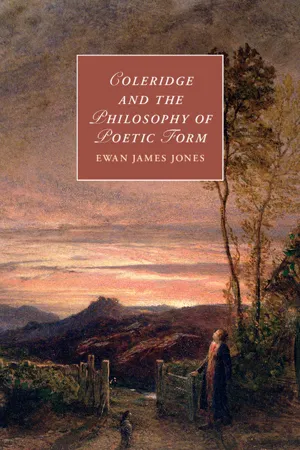
- English
- PDF
- Available on iOS & Android
Coleridge and the Philosophy of Poetic Form
About this book
Ewan James Jones argues that Coleridge engaged most significantly with philosophy not through systematic argument, but in verse. Jones carries this argument through a series of sustained close readings, both of canonical texts such as Christabel and The Rime of the Ancient Mariner, and also of less familiar verse, such as Limbo. Such work shows that the essential elements of poetic expression - a poem's metre, rhythm, rhyme and other such formal features - enabled Coleridge to think in an original and distinctive manner, which his systematic philosophy impeded. Attentiveness to such formal features, which has for some time been overlooked in Coleridge scholarship, permits a rethinking of the relationship between eighteenth-century verse and philosophy more broadly, as it engages with issues including affect, materiality and self-identity. Coleridge's poetic thinking, Jones argues, both consolidates and radicalises the current literary critical rediscovery of form.
Frequently asked questions
- Essential is ideal for learners and professionals who enjoy exploring a wide range of subjects. Access the Essential Library with 800,000+ trusted titles and best-sellers across business, personal growth, and the humanities. Includes unlimited reading time and Standard Read Aloud voice.
- Complete: Perfect for advanced learners and researchers needing full, unrestricted access. Unlock 1.4M+ books across hundreds of subjects, including academic and specialized titles. The Complete Plan also includes advanced features like Premium Read Aloud and Research Assistant.
Please note we cannot support devices running on iOS 13 and Android 7 or earlier. Learn more about using the app.
Information
Table of contents
- Cover
- Half title
- Series
- Title
- Copyright
- Dedication
- Contents
- Acknowledgements
- List of abbreviations
- Introduction: Coleridge’s philosophy of poetic form
- 1 ‘Less gross than bodily’: Interruption in the conversation poem sequence
- 2 ‘Some transition, in the nature of the imagery or passion’: Rhythm and affect in ‘Christabel’
- 3 ‘Earth worm wit lies under ground’: ‘Limbo’ and the philosophy of the pun
- 4 The scandal of tautology: The ‘Rime’ and the tautegorical symbol
- Coda: The philosophy of poetic form
- Notes
- Bibliography
- Index